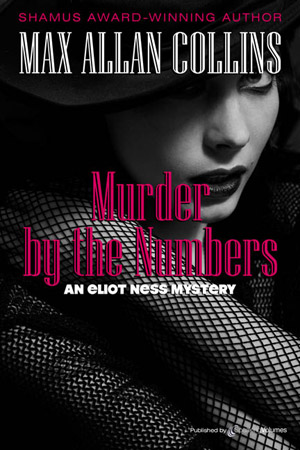The physical editions of my books at Wolfpack have started to kick in! You can get Murder – His & Hers right now. And all four Ness novels are individually available – [Amazon links] The Dark City, Butcher’s Dozen, Bullet Proof, and Murder by the Numbers. They share the same cover as the Eliot Ness Mystery Omnibus, but with variant colors.
* * *
Barb and I – thanks to the efforts of our son Nate – were able to watch Bill and Ted Face the Music on its opening night, streaming it. We love Bill and Ted’s Excellent Adventure, and also like the sequel, Bill and Ted’s Bogus Journey; I would put this long awaited third installment on at least a par with the sequel.
Like its predecessors, it’s a very smart movie about a couple of lovable dudes who are perhaps not as dumb as they appear, rather are just of their time and generation. As Nate commented, in the midst of this Covid/Trump reality, for one sweet funny evening, the world felt normal again. Like nothing had changed.
But we shouldn’t get too cocky about the past. Of late, Barb and I have been watching a lot of film and TV adaptations of Charles Dickens novels, escaping from 2020 into the 1800s. That escape, though, has an uncomfortable number of parallels – homeless people (check), government-abused kids (check), an unfair court system (check), corrupt politicians (check), an uncaring wealthy class (check), pollution (check), disease (check)…and on and on.
Still, it’s another time and place and kind of a relief to be anywhere but here. So I’ll recommend a few of the really worthwhile Dickens adaptations. All of these are available on DVD and some on Blu-ray, with many available for streaming.
If you have the time, nothing beats the eight-hour-plus stage version (on video) of Nicholas Nickleby (1982), the Hamilton of its day. Standouts in a huge cast are Roger Rees in the title role and definitive Dickens actor Alun Armstrong as (among other characters) the ignorant, sadistic schoolmaster Squeers.
David Lean was one of the greatest filmmakers of all time, and his two Dickens adaptations are as good as movie versions get: Great Expectations (1946) with John Mills and Alec Guinness; and Oliver Twist (1948) with Robert Newton and Anthony Newley (not the main actors but favorites of mine). Add to that list, of course, Scrooge (1951) with Alistair Sim (which I’ve lauded here many times).
Andrew Davies has scripted two relatively recent BBC mini-series that are the gold standard of Dickens TV adaptations: Bleak House (2005) with Gillian Anderson and
Charles Dance; and Little Dorrit (2008) with Claire Foy and Matthew Macfadyen. The Mystery of Edwin Drood (2012), scripted by Gwyneth Hughes, is first-rate, too, especially Drood actor Matthew Rhys, who is now (of course) Perry Mason.
As good as David Lean is, the BBC’s early ‘80s long-form renditions (often a dozen half-hour episodes, which suggest the serialized format of the original Dickens works) are in some ways superior, as they tend to adapt each novel in its near entirety. When certain colorful incidental characters in Dickens are, understandably, omitted from films two hours or less in length, much of the richness and humor of the original novels is lost.
Also, aspects of Dickens are distorted in the shorter form of films and TV movies. Yes, there are wild coincidences, but when woven throughout a very long narrative, filled with characters, those coincidences seem a part of the fabric of life and not convenient plot devices. And without the deeper characterizations, the principal characters can seem to be chess pieces Dickens is moving, a feeling one doesn’t get from the books.
For example, not just including David Lean’s version, Great Expectations has been filmed a number of times quite effectively. The BBC mini-series with Gillian Anderson and David Suchet is excellent. But the far less lavish 1981 BBC mini-series, with its six-hour length, tells the entire story of the novel, with much deeper characterizations than any other adaptation, especially for Pip (Gerry Sundquist) and his convict friend (Stratford Johns. The definitive Miss Marple, Joan Hickson, turns outalso to be the definitive Miss Havisham, bringing remarkable depth to a character who can be a cartoon.
Less celebrated Dickens novels come to worthwhile life, too, in the longer-form ‘80s and ‘90s BBC adaptations – Domby and Son (1983), another Andrew Davies script; Martin Chuzzlewit (1994) with Paul Scofield and Tom Wilkinson; David Copperfield (1999) with Bob Hoskins and Maggie Smith; and Our Mutual Friend (1998) with Steven Mackintosh and Keeley Hawes.
I mentioned actor Alun Armstrong above. Of the films and TV versions I’ve mentioned here, he is in about half. He has played villains, lovable sorts, and even made a great Inspector Bucket. We thought he did a great job in Martin Chuzzlewit, too, until we realized that was Pete Postlethwaite.
Look, there are plenty of good and at least watchable Dickens adaptations. But these are worth your time. Are there any that aren’t?
Hard Times (1994) with Alan Bates and Richard E. Grant is a hard go. Bates is a fine actor but he hams it up here, in a grotesquely arty, misjudged take on Dickens.
The Old Curiosity Shop (1979) is, in my probably worthless opinion, as bad as Dickens ever got; he seems to be spoofing himself without his readers realizing it, like the Turtles doing a parody of themselves with “Elinore” (“I really think you’re groovy, let’s go out to a movie”) and nobody getting it. But the novel deserved better than the 1979 BBC mini-series with its cringingly over-the-top Trevor Peacock’s Quilp at centerstage.
Of course, the ridiculously villainous Quilp is part of why I think Dickens is having a laugh at himself and his audience (right down to, SPOILER ALERT, killing Little Nell). Much better, though little seen (particularly in its longer, richer version), is Anthony Newley sending Quilp and himself up in the 1975 musical variously known as Mr. Quilp and The Old Curiosity Shop. The assumption that audiences who enjoyed Carol Reed’s recent Oliver! would adore Dickens’ dreary self-parody was probably the first mistake; still, this version is pretty good.
Newley, who as a child star made his first major claim to fame playing the Artful Dodger for David Lean, was coming full circle with his outrageously over-the-top Quilp, throwing in for good measure a solid score he wrote himself (not his best, as that was invariably reserved for his collaborations with Leslie Briccuse). Newley, who died at 67, enjoyed a final triumph starring in the Briccuse musical Scrooge on the West End and touring the UK provinces.
I don’t recall if I’ve mentioned Newley here before. He is on my very short list of “ideels” (as Li’l Abner described Fearless Fosdick). It’s a list including people like Bobby Darin, Mickey Spillane, Audie Murphy and Jack Webb. My ideels, each and every one it would seem, somehow demand defending – Darin was an obnoxious pretender, Spillane ruined mystery fiction, Murphy couldn’t act, Jack Webb was a joke. I have defended all of them and will continue to do so till my dying day.
As for Newley…
He is a genuinely quirky and willfully mannered performer, his distinctive vocal style the kind of thing that kept impressionists in business in the ‘60s and ‘70s. He is also the primary influence on David Bowie as a singer and performer, something Bowie often admitted.
With Briccuse, Newley wrote two great Broadway scores, each filled with standards: Stop the World I Want to Get Off and Roar of the Greasepaint, Smell of the Crowd. With Briccuse and John Barry, he wrote the theme for Goldfinger. He and Briccuse wrote the music for Willy Wonka – “Candy Man” and “Pure Imagination” and even the ditty sung by the Oompah Loompahs.
While to my knowledge it’s never been revived (Stop the World has been a number of times), Roar of the Greasepaint has not. Among the songs are “Who Can I Turn To,” “On a Wonderful Day Like Today,” “The Joker,” and the remarkably resilient “Feeling Good.”
In 1965 in New York, on summer vacation with my parents, I saw Roar of the Greasepaint at the Shubert Theater. I have seen many musical plays, including any number on Broadway and many more in Chicago, and countless concerts by stars of both the Vegas variety and the rock persuasion.
I’ve never seen anything better than Roar of the Greasepaint, Smell of the Crowd. Nothing as compelling or as funny or as mesmerizing. Newley’s was the single best performance I’ve ever seen. He was not unsupported: Captain Hook himself, Cyril Ritchard, was a regal “Sir” to Newley’s cockney Cocky – both were tramps, bums, with more than a hint of circus clown. Amid urchins out of Oliver!, with other contestants a beautiful woman and a black man, they played the Game of Life, with Sir making up and changing and rearranging the rules as they went.
I am going to share with you some of what I saw that night. Newley, right around the time I saw him performing at the Shubert, appeared on Ed Sullivan. In costume and in character, he delivered an amazing “Who Can I Turn To,” a song brilliantly conceived by its authors to work as an unrequited love song and, in the show’s context, as being addressed by Cocky to the God who has abandoned him. Have a look.
We’ll talk about his film Can Heironymus Merkin Ever Forget Mercy Humppe and Find True Happiness? another time.
* * *
Eliot Ness and the Mad Butcher is deemed one of six true crime books you should be reading right now.
Finally, you kind of have to dig for it, but a discussion of one of my Batman stories can be found in this essay about Batman vs. Batman.
M.A.C.
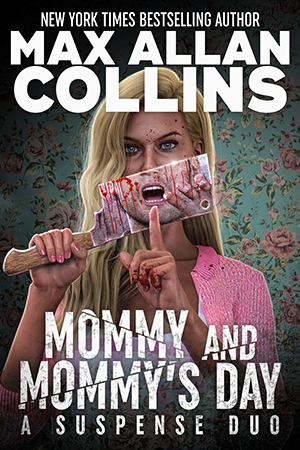
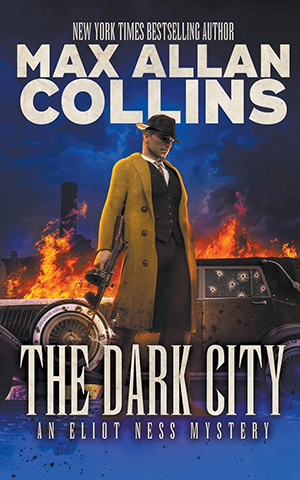
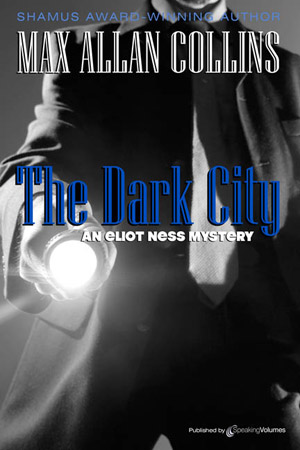 The Dark City:
The Dark City: 

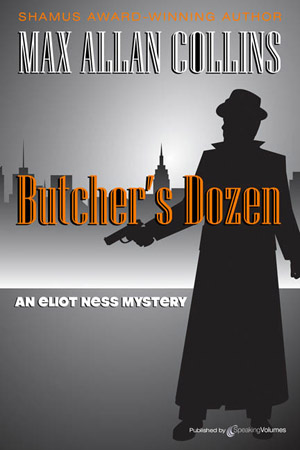
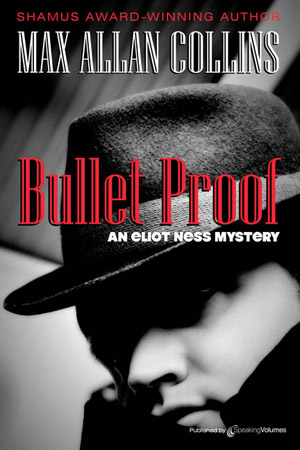 Bullet Proof:
Bullet Proof: 